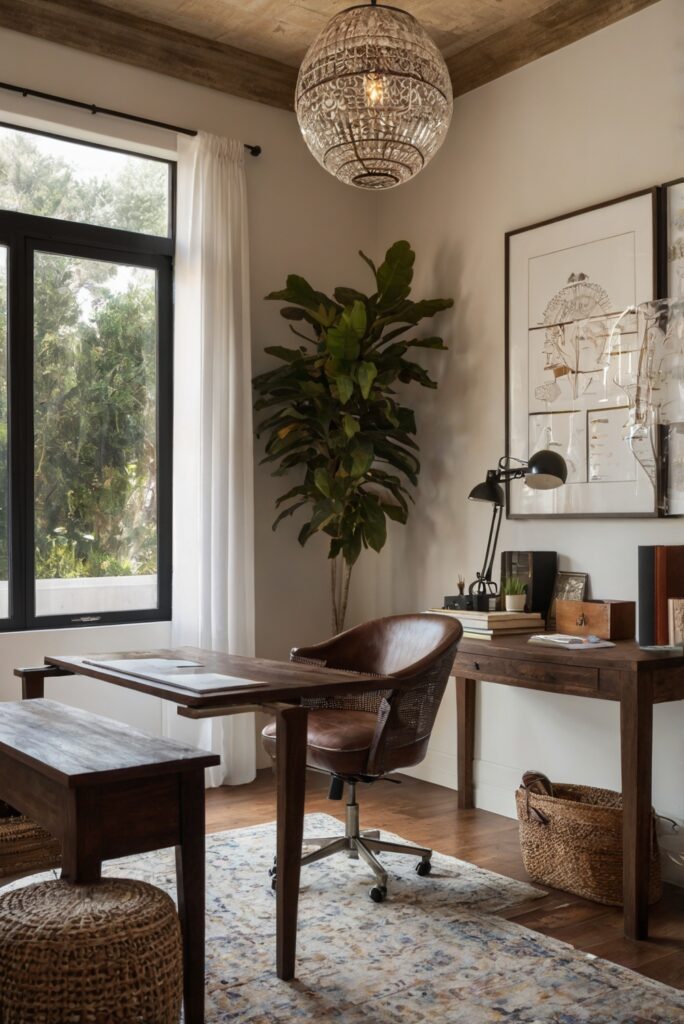Enhance your study sessions with a well-designed home office desk. Discover daily interior designer routines to create a productive workspace for studying at home.
To create a productive home office desk for studying, incorporate a minimalist design with a designated work area free of distractions. Use a sturdy desk and comfortable chair for long study sessions. Implement proper lighting, like a desk lamp or natural light, to reduce eye strain. Personalize your space with motivating decor, such as inspirational quotes or plants. Organize your desk with storage solutions like shelves or drawers for easy access to study materials. Consider the color scheme of your workspace to boost focus and productivity. Opt for calming colors like blues or greens for a peaceful study environment conducive to learning and concentration. Remember to declutter regularly to maintain a clean and organized workspace.
By following these home decorating and interior design tips, you can create an inspiring study space that promotes productivity and enhances your studying experience.
How to Create a Productive Home Office Desk for Studying?
Setting up a productive home office desk for studying is crucial for maximizing efficiency and focus. Here are some key steps to create an ideal study space:
– **Choose the Right Location**: Select a quiet area in your home with good natural light and minimal distractions. Position your desk near a window if possible to boost your mood and productivity.
– **Invest in a Comfortable Chair**: A supportive chair with proper ergonomics is essential for long study sessions. Choose a chair that promotes good posture and reduces the risk of back pain.
– **Organize Your Desk**: Keep your desk clutter-free and organized. Use desk organizers, trays, and shelves to store books, stationery, and other study materials. A tidy desk can help reduce stress and improve focus.
– **Personalize Your Space**: Add personal touches like plants, photos, or motivational quotes to make your study area more inviting and inspiring. Surround yourself with items that boost your mood and motivation.
– **Use Proper Lighting**: Good lighting is essential for studying. Invest in a desk lamp with adjustable brightness to reduce eye strain and create a well-lit workspace.
– **Minimize Distractions**: Keep your study area free from distractions like smartphones, TVs, or noisy appliances. Consider using noise-canceling headphones or playing background music to help you concentrate.
How to Stay Organized at Your Home Office Desk?
– **Create a To-Do List**: Start each study session by outlining your goals and tasks for the day. A to-do list can help you stay on track and prioritize your work effectively.
– **Use a Planner or Calendar**: Keep track of deadlines, exams, and important dates using a planner or digital calendar. Schedule study sessions, breaks, and leisure time to maintain a healthy work-life balance.
Final Thoughts on Creating a Productive Home Office Desk for Studying
– **Optimize Your Desk Setup**: Experiment with different desk layouts, accessories, and tools to find what works best for you. Consider investing in a standing desk, monitor riser, or ergonomic keyboard to enhance your comfort and productivity.
– **Take Breaks**: Remember to take regular breaks during study sessions to prevent burnout and maintain focus. Use the Pomodoro technique or other time management strategies to break up study time into intervals.
– **Stay Hydrated and Energized**: Keep a water bottle and healthy snacks on your desk to stay hydrated and nourished during long study sessions. Avoid sugary drinks and snacks that can lead to energy crashes.
– **Seek Support**: If you’re struggling with studying at home, reach out to friends, family, or online communities for support and motivation. Consider joining study groups or virtual study sessions to stay connected and accountable.
– **Prioritize Self-Care**: Remember to prioritize self-care and well-being while studying at your home office desk. Get enough sleep, exercise regularly, and practice mindfulness or relaxation techniques to reduce stress and improve focus.
Creating a productive home office desk for studying requires careful planning, organization, and attention to detail. By following these tips and strategies, you can design a study space that enhances your productivity, focus, and overall well-being. Experiment with different approaches and tools to find what works best for you and don’t hesitate to seek support or make adjustments as needed. With a well-designed home office desk, you can create an optimal environment for learning, growth, and success in your academic pursuits.
1. Ergonomic Setup:
Creating a productive home office desk for studying starts with setting up an ergonomic workspace. Ensure your desk and chair are at the right height to avoid strain on your back and neck. Use a supportive chair with proper lumbar support to maintain good posture.
2. Organized Workspace:
Keep your desk clutter-free and well-organized. Use organizers, trays, and folders to categorize your study materials. A tidy workspace can help you stay focused and avoid distractions.
3. Proper Lighting:
Good lighting is essential for studying. Position your desk near a window for natural light or invest in a desk lamp with adjustable brightness. Avoid glare on your computer screen to reduce eye strain.
4. Personalized Touch:
Add personal touches to your home office desk to make it a comfortable and inspiring space. Decorate with plants, photos, or motivational quotes to create a positive study environment.
5. Breaks and Movement:
Take regular breaks and incorporate movement into your study routine. Stand up, stretch, or take a short walk to refresh your mind and prevent fatigue. Movement can improve focus and productivity.

